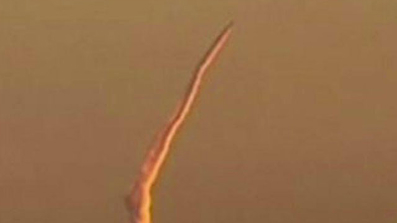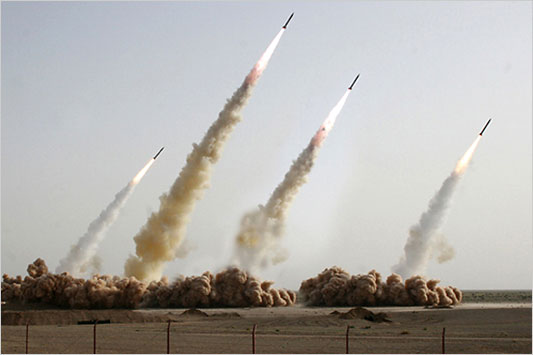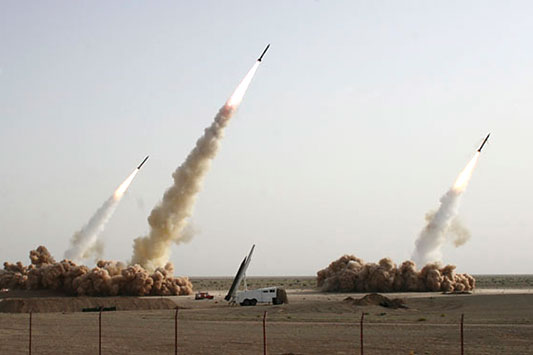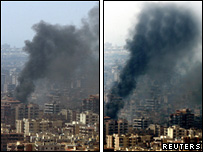Which is a real concern for folks living in South Korea, among others.
Whether or not the under-fed, ill-equipped North Korean soldiers really believe the propaganda they're fed - it's likely that they believe that they'll be punished if the don't do what the nearest general tells them. Like fire on a South Korean naval ship, or set fire to civilian buildings.
Paranoia, No: Prudence, Yes
I've mentioned Frank Burns, the idiot patriot and quack doctor in the M*A*S*H television series. One of my favorite episodes included a vignette of Dr. Burns looking for land mines in his toothpaste.That's crazy. It's also funny, and fiction.
This is the real world.
Sadly, no matter how many factually-challenged paranoiacs infested America of the 1950s, today's North Korea is a serious - and very real - problem for anyone within about 2,000 miles - give or take a few hundred.
North Korea's nuclear weapons probably aren't all that much. Last year, Russia confirmed that North Korea had tested a 20-kiloton nuclear bomb. (GlobalSecurity.org (May 25, 2009)) That's a little more powerful than the bomb that devastated Hiroshima, but not by all that much. (GlobalSecurity.org (November 14, 1996))
If North Korea decided to launch a nuclear warhead against, say, Tokyo, folks living on the other side of Mt. Odake might not be hurt a bit. Not directly, anyway. But it would still be a really bad day for Tokyo. And the rest of Japan - and the world.
That 'no man is an island' stuff isn't just poetry. We live in a very interconnected world, and what happens in one nation gets felt everywhere.
I have no reason to believe that someone in North Korea will think it's a good idea to obliterate part of a Japanese city. Or one in South Korea. I have little reason to think that someone won't, either.
It'd be nice if everybody would be nice: but the last several thousand years of recorded history don't suggest that 'being nice' is as common a practice as it should be.
North Korea, Scrambling for Power, and "Miscommunications"
As for North Korea: It looks like Kim Jong Il is - willingly or not - turning control of the country over to someone else. Given the sort of operation he's been running, there could be quite a scramble soon, as generals and other wannabe warlords make a grab for power.Then there are rumors, mentioned in the following article, about "miscommunications or worse within the North's command-and-control structure."
It's the sort of thing that makes me glad to live over a thousand miles from the Pacific Ocean, deep in the heart of North America.
Excerpts from:Related posts:
"North Korea's military aging but sizeable"
Tim Lister, CNN World (November 24, 2010)
"It's a bit like train-spotting but rather more serious. On October 10, Korea-watchers pored over live televised coverage of a massive military parade in Pyongyang, held to mark the 65th anniversary of North Korea's ruling party. Just like the Soviet parades of yore, it was a chance to see what military hardware the North might be showing off.
"The official news agency said the parade showed 'the will and might of Songun Korea to wipe out the enemy.' The hardware was accompanied by slogans such as 'Defeat the U.S. Military. U.S. soldiers are the Korean People's Army's enemy.' And besides the incredible synchronized goose-stepping, there were tanks and new missiles.
"Analysts paid special attention to the first public appearance of a road-mobile ballistic missile with a projected range of between 3,000 and 4,000 kilometers (roughly 1,900 to 2,400 miles), though reports of its existence had circulated for several years.....
"...North Korea's nuclear capability and ballistic missile technology are its trump card, to make up for its aging conventional forces and as a bargaining chip in negotiations. So that's what receives the bulk of funding and expertise. But despite economic stagnation, technological limitations and international sanctions, its conventional forces can't be discounted, if only because of their size.
"According to South Korean analysts, the North scraped together what little foreign exchange it had to buy $65 million of weapons from China, Russia and eastern Europe between 2002 and 2008. One example: It appears to have bought Chinese-made ZM-87 anti-personnel lasers, using one to 'illuminate' two U.S. Army Apache helicopters flying along the southern side of the Demilitarized Zone in 2003. None of the crew members was injured.
"China says it continues to be open to military collaboration with Pyongyang and last month welcomed a senior North Korean official to Beijing to 'enhance coordination of the two militaries.' China is thought to have supplied the North with multiple rocket launchers and spare parts for planes, among other equipment. Pyongyang has also turned to Iran and Egypt for military transfers.
"Much of the North's hardware is locally built using Chinese and Russian templates. It has begun deploying a new tank, called the P'okpoong (Storm), which is modeled on the Russian T-62 tank but hardly a match for modern U.S. battle tanks. It's not clear how many of these are in service, but Jane's Armed Forces Editor Alexander von Rosenbach says it is thought that only a few have been delivered -- and they lack devices like thermal imaging sights.
"Also on show at the October parade: a new surface-to-air missile similar to a Chinese model. Jane's concluded that it represented 'a major expansion in North Korea's air defense potential,' with a radar/guidance system that would be harder to jam. And although little is known about the size and scope of the North's artillery, the barrage fired this week at Yeonpyeong Island suggests that it can't be ignored.
"The North Korean regime has also devoted great resources to developing its navy, not with battleships but fast-attack vessels and an array of submarines. Jane's estimates that it has more than 400 surface vessels. And it is not hesitant to use its maritime forces, as demonstrated by the sinking of the 1,200-ton South Korean corvette Cheonan by a torpedo in March. But in a confrontation, the South Korean navy is likely to come off best, as happened in a firefight in 1999.
"The main weakness of the North's military is a chronic shortage of computers, modern command and control and electronic warfare assets -- in other words, much of what makes up the 21st-century battlefield. At the same time, South Korea has used its economic strength to modernize its armed forces: for example, building three $1 billion Aegis-class destroyers to counter ballistic missiles.
"The same applies in the air. North Korea's air force largely comprises aging Soviet MiG fighters (though it has some MiG 29s) .... In addition, the North's air force has suffered fuel shortages, and Jane's estimated that the North's fighter pilots may get as little as 25 flying hours per year. The North Koreans also have a large fleet of Russian-design biplanes that would be better suited to crop-spraying but could be used to drop special forces behind enemy lines in the event of conflict.
"To compensate for obsolescence, the North deploys boots on the ground in great numbers. Jane's estimates that its standing army numbers just over 1 million personnel, with reserves estimated at more than 7 million. But North Korean soldiers are poorly fed, according to analysts and reports from defectors, and rarely train due to scarcity of fuel and ammunition....
"...'With the ongoing leadership transition in North Korea, there have been rumors of discontent within the military, and the current actions may reflect miscommunications or worse within the North's command-and-control structure,' geopolitical risk analysis firm Stratfor says....
"...Short of a general assault, the North clearly has enough in its arsenal to cause damage and death to its adversary, as the torpedo attack in March and the barrage this week have shown. And it has thousands of artillery pieces close to the Demilitarized Zone, which is just 30 kilometers (18 miles) from Seoul. Recent events show that it is also quite ready to exploit the element of surprise...."
- "Korea: 'South Korean Puppet Group' and the Real World"
(November 23, 2010) - "South Korean Navy Ship Just Happens to be Sinking"
(March 26, 2010) - "Cyber-Attack Started July Fourth: Common Sense, Security, and the War on Terror"
(July 10, 2009) - "North Korea's Still There, Still a 'Serious Concern' "
(June 24, 2009) - "North Korea and the Kim Jong Dynasty: Not All Countries are the Same"
(June 9, 2009) - "North Korea, Nuclear Weapons, Brinksmanship, and Miscalculation"
(May 27, 2009) - "North Korea's City-Busting Nuke, a New Missile, and Diplomacy"
(May 25, 2009) - "North Korea and Missile Concerns: Nations are Not All Identical"
(April 5, 2009) - "Nuclear Materials from North Korea, Sand, or Radioactive Kimchi?"
(September 18, 2007)




